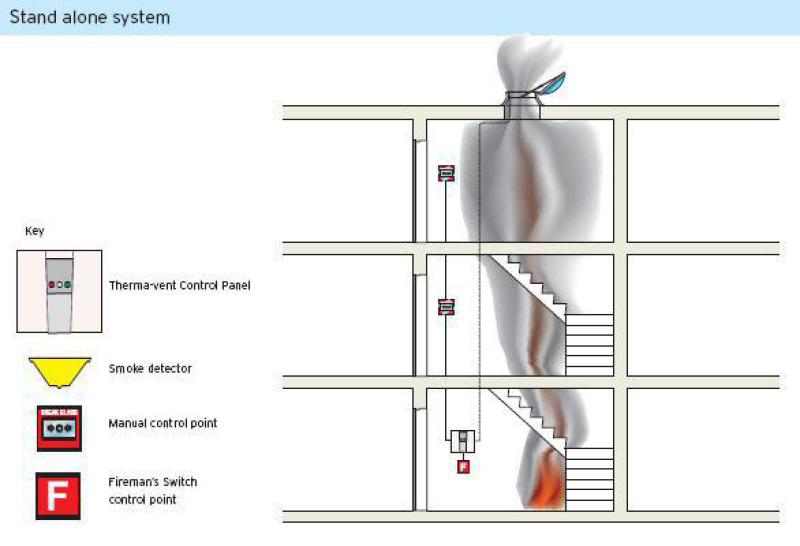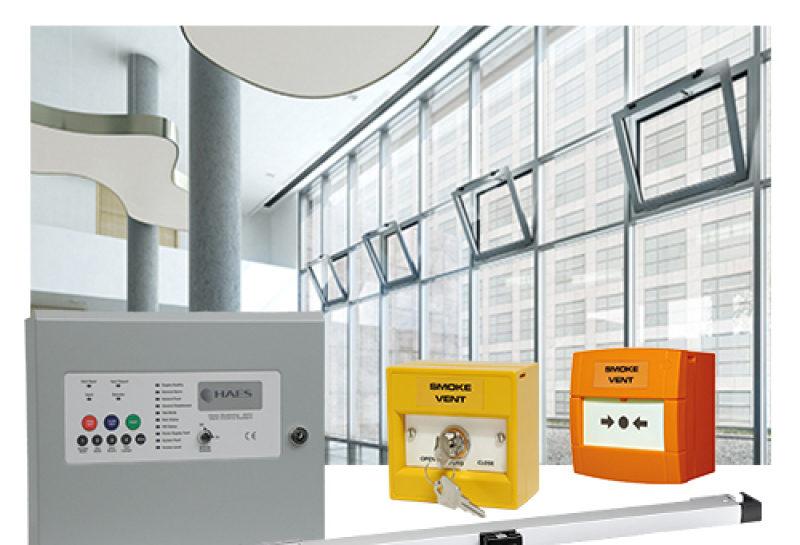What is An AOV System?
An AOV system (automatic open ventilation) is a great fire safety system that helps limit the inhalation of smoke during a fire. The system is designed to control the
ventilation of smoke in a fire. It does this by creating and maintaining a smoke-free layer above the floor during an outbreak of a fire, reducing the build-up of smoke and heat.
Smoke is the biggest killer in situations of fires. It can spread through an entire building within minutes. Automatic Opening Vents are critical to keeping access
areas clear in case of an emergency, protecting those in danger from smoke inhalation and giving them the clearest possible evacuation routes.
AOV types can range from automated roof hatches, and glazed or metal louvres to wall-mounted end-of-corridor vents, automatic opening vent windows and internal smoke
shaft damper doors. When used in combination they can also provide an effective way to reduce heat in a burning building.
Why install an AOV smoke control system?
Advanced smoke ventilation for safe evacuation
In case of a fire breaking out in a building, installing an AOV smoke control system can provide the following benefits:
Keep escape and access routes free from smoke
Improve visibility to ease firefighting operations
Delay and/or prevent full-fire development
Protect equipment, furnishings and contents
Reduce effects of heat on structural components during a fire
Reduce damage caused by thermal decomposition products and hot or harmful gases like CO2
We offer complete maintenance servicing on all AOV systems. Servicing reduces the likelihood of component failure and prolongs the system’s life. We also provide
callouts if something goes wrong with an AOV system. For example, if your roof hatch breaks or fails to open, we’re on hand to correct any faults or issues preventing safety.
Contact us today to learn more about our fire safety services for your building or arrange a full fire risk assessment for your property.
Durcan Services offer Automatic Opening Vents repair, Automatic Opening Vents service and Automatic Opening Vents testing to ensure our customer stay compliant
with their fire safety equipment.
Building regulations for AOV windows:
Approved Document B – Fire
Safety
The regulations for what a building must be fitted with to prevent the spread of fire are covered in Approved Document B. Specifically, Approved Doc B Volume 2 covers
buildings other than dwelling houses, the areas where AOV windows are commonly used. For residential buildings, it’s essential for a fire detection and alarm system to be in place, plus there should
be adequate means of escape.
Approved Document F –
Smoke Control and Ventilation
Building regs Document F sets out how ventilation is to be provided for specific buildings. The method for ventilation will vary depending on the type of building,
the layout, the number of occupants and how the upper floors are reached (by elevator, stairway or alternative method). Approved Document F also aims to prevent the accumulation of smoke
within buildings. This is important for providing a means of escape during the event of a fire. More than one Automatic Opening Vent may be required for smoke control purposes, however, in
multi-storey buildings, they’re usually fitted above the staircases.
Approved Document L –
Conservation of Fuel and Power
Approved Document L regulates how much thermal insulation should be provided by smoke vents. The document points out that smoke vents should be designed in a way to
prevent excessive heat loss. U-Values are the unit for measuring heat loss and the lower the U-Value, the smaller amount of heat transmittance or heat loss. To comply with Approved Document L, any
smoke vents must have a U-Value of 3.5 W/m2k or lower. Specifically, the two documents mainly relevant to AOV window regulations are:
Approved Document L2A, which covers new buildings other than dwellings
Approved Document L2B, which covers existing buildings other than dwellings

Standards and
certification for AOV windows:
BS EN12101-2
BS EN12101-2 is the harmonised European standard for smoke and heat control. A stringent AOV testing procedure must be performed before an AOV window is certified to
this standard. However, this standard applies to every component used as part of a smoke control system. Plus, the whole system has to be tested as a collective unit to comply with Building
Regulations.
CE Marking
CE marking certification demonstrates that the AOV has passed all the required tests.
How often should an AOV be
tested?
Once a month, AOVs should be tested using the manual controls to make sure that they are working as they should be. Plus, a full test, which includes checking any
smoke detectors and other AOV controls, should be performed yearly.
For more information on how we can help install, repair or maintain your
property, call us today on 0800 77 20206 or email info@durcans.co.uk
We offer a no obligation assessment and
quotation.
We cover most area's within England including Stevenage
· Milton Keynes · Cambridge · Northampton · Peterborough · Bedford · Norwich · London · Hertfordshire · Essex · Dartford · Cambridgeshire · Kent · Suffolk ·
Leicestershire · Bedfordshire · Buckinghamshire · Surrey






